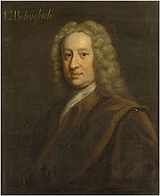
politician, government official and political philosopher. He was a leader of the Tories, and supported the Church of England politically despite his atheism. In 1715 he supported the Jacobite rebellion of 1715
which sought to overthrow the new king George I
. Escaping to France he became foreign minister for the Pretender. He was attainted
for treason, but reversed course and was allowed to return to England in 1723.
I have read somewhere or other, — in Dionysius of Halicarnassus|Dionysius of Halicarnassus, I think, — that history is philosophy teaching by examples.![]()
Nations, like men, have their infancy.![]()
They (Thucydides|Thucydides and Xenophon|Xenophon) maintained the dignity of history.![]()
The landed men are the true owners of our political vessel, the moneyed men are no more than passengers in it.![]()
It is the modest, not the presumptuous, inquirer who makes a real and safe progress in the discovery of divine truths. One follows Nature and Nature's God; that is, he follows God in his works and in his word.![]()
The shortest and surest way of arriving at real knowledge is to unlearn the lessons we have been taught, to mount the first principles, and take nobody's word about them.![]()

